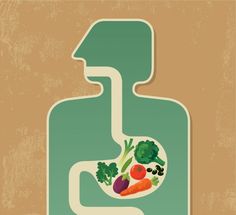
Do you suffer from digestion problems? Do you have any issues, such as gas and bloating, constipation, loose stools, or food sensitivities? Food transit time, or the amount of time it takes for food to move from ingestion through elimination, plays a role in how healthy your system may be. Specifically, slower transit times (digestive time) allow more time for toxins and harmful degradation particles to negatively affect your health.
IDEAL FOOD TRANSIT TIME
According to holistic nutrition consultant, Chantale Michaud, R.H.N., food transit time varies by individual, as well as by men and women. But in general, 12 to 24 hours is the ideal transit time to aim for, for food to move from the mouth to elimination. A quicker transit time, especially less than 10 hours, could result in severe nutritional deficiencies and electrolyte imbalances because the food is quickly ‘passing through’ the digestive system, too quickly for the nutrients to absorb. Transit times that last longer than 2 days may increase risk of cancer and other related diseases. This is a time to have a checkup with a gastro-intestinal specialist.
Having one or more bowel movements per day is NOT a testament that you have an ideal transit time because the stools coming out could be from many days, or even a week or more, of food backup in your system. The only way to know for sure is to give yourself a bowel transit test. Here’s how: identify a piece of food that could be identified in your bowels, such beets that turn stools ‘beet red’ when being eliminated… or even corn kernels or other foods that could be identified in your stools. Then, track the number of hours that it takes for that food to move through your digestive system, from your mouth to your poop stools. This is called your Food Transit Time.
Again, if you find that your food transit time is very short or very long, it is advised that you get a check up with your medical practitioner to explore what my be going on.
In general, a few of the factors that may be influenicing your transit time are:
HYDRATION: Logically, when you drink the appropriate number of glasses of water that are right for you in a day, your bowels may run smoother and quicker. Too little water could influence constipation and other difficulties, and too much could influence a host of other problems, too, such as a loss of electrolytes and other nutrients in the system. Many experts may try to convince you that you could NEVER drink too much water, but this is not true. The popular rule of thumb is that one should drink about EIGHT 8-ounce glasses of water per day. Water makes up approximately 60% of an adult’s body weight. For more information on hydration issues, click here.
OTHER FACTORS: Other factors to consider for improving your food transit time are: type of food, and in particular, amounts of fiber foods; levels of exercise; medications and other health considerations.
CONCLUSION
When most of us think about our digestive health, we do not necessarily consider the fact that the transit time has a powerful effect on our overall health. But, it makes sense that it does, given the fact that the slower transit time gives more opportunistic time for toxins and wastes to circulate in the system and cause other difficulties. In contrast, very short transit times pose other problems, such as insufficient time for nutrients to be absorbed. Therefore, this is an important area to understand and focus on. To learn more, check out this information:
